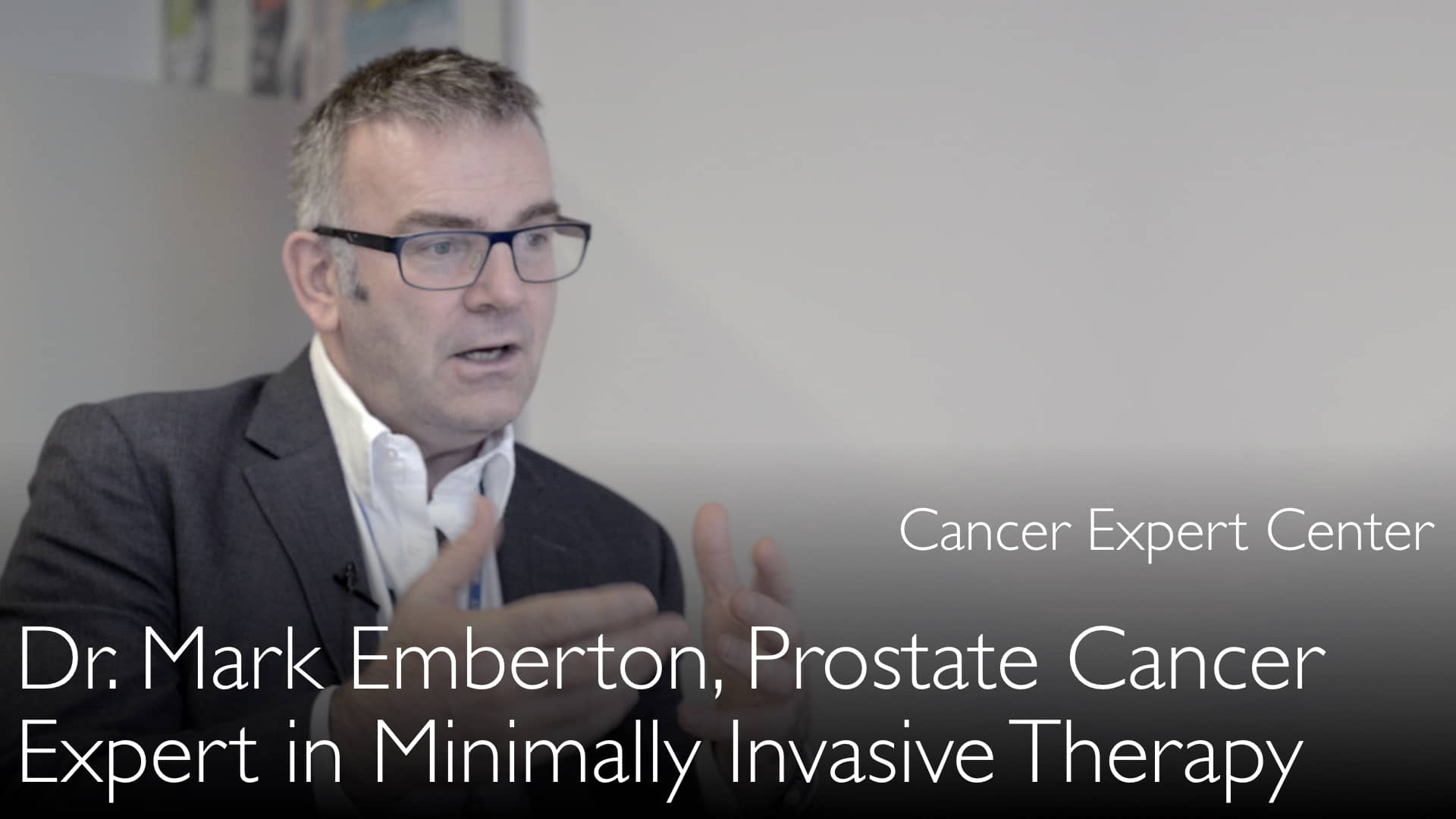Leading expert in prostate cancer minimally invasive treatment, Dr. Mark Emberton, MD, explains the latest advancements in diagnosis and therapy. He discusses the integration of bioengineering and nanotechnology into clinical trials, aiming to improve patient outcomes and reduce side effects. Dr. Emberton's work focuses on refining diagnostic accuracy and developing novel, less invasive therapeutic options for men with prostate cancer.
Innovations in Prostate Cancer Diagnosis and Minimally Invasive Treatment
Jump To Section
- Prostate Cancer Diagnosis Advancements
- Minimally Invasive Treatment Options
- Prostate Cancer Prognosis Factors
- Experimental Therapies and Research
- Improving Patient Outcomes
- The Future of Prostate Cancer Care
Prostate Cancer Diagnosis Advancements
Accurate prostate cancer diagnosis is the critical first step toward effective treatment. Dr. Mark Emberton, MD, leads a world-renowned research group dedicated to improving diagnostic methods. His team's work helps to distinguish between aggressive cancers that require immediate intervention and slower-growing tumors that may be managed with active surveillance.
Advanced imaging techniques and biomarker tests are now providing urologists with a clearer picture of the disease. These tools allow for more precise targeting during biopsies, increasing the likelihood of detecting clinically significant cancer. This precision reduces the risk of overdiagnosis and overtreatment of low-risk prostate cancer.
Minimally Invasive Treatment Options
Minimally invasive treatment for prostate cancer is a primary focus of Dr. Mark Emberton, MD's clinical and research efforts. These therapies aim to destroy cancerous tissue while preserving surrounding healthy structures, such as nerves responsible for urinary and sexual function. This approach significantly reduces the side effects commonly associated with traditional surgery or radiation.
Techniques like focal therapy, which treats only the area of the prostate containing the tumor, are at the forefront of this movement. Dr. Emberton's expertise in this area offers patients effective cancer control with a much better quality of life post-treatment. The goal is to provide curative treatment with minimal impact on a patient's daily activities.
Prostate Cancer Prognosis Factors
Understanding prostate cancer prognosis involves evaluating several key factors, including the Gleason score, PSA levels, and cancer stage. Dr. Mark Emberton, MD, emphasizes that a personalized assessment is essential. A favorable prognosis is often associated with cancer that is detected early and is localized to the prostate gland.
Advances in diagnostic precision directly influence prognosis by ensuring the disease is accurately characterized from the outset. This allows Dr. Emberton and his colleagues to recommend the most appropriate treatment strategy, whether it's immediate intervention for aggressive disease or active surveillance for low-risk cancer, ultimately leading to better long-term outcomes.
Experimental Therapies and Research
The field of experimental treatment for prostate cancer is rapidly evolving, thanks to pioneers like Dr. Mark Emberton, MD. His research uniquely combines bioengineering and nanotechnology with early-phase clinical trials. This interdisciplinary approach seeks to develop next-generation therapies that are more effective and less toxic than current standards of care.
These innovative trials often explore novel ways to deliver energy or targeted agents directly to cancer cells. Dr. Emberton's work, supported by over 320 peer-reviewed publications, is crucial for translating laboratory discoveries into tangible benefits for patients. This commitment to research ensures that new, promising treatments become available to men facing a prostate cancer diagnosis.
Improving Patient Outcomes
Ultimately, every advancement in prostate cancer care is measured by its impact on improving patient outcomes. Dr. Mark Emberton, MD's leadership in urological oncology focuses on this central goal. By refining diagnostics and pioneering minimally invasive treatments, his work directly enhances survival rates and quality of life for countless men.
The holistic approach taken by Dr. Emberton considers not just the cancer, but the whole person. Reducing treatment-related side effects like incontinence and erectile dysfunction is a major priority. This patient-centered philosophy ensures that men can return to their normal lives quickly and confidently after treatment.
The Future of Prostate Cancer Care
The future of prostate cancer care is bright, driven by continuous research and technological innovation. Dr. Mark Emberton, MD, is at the helm of this progress, frequently sharing his insights at international cancer meetings. The integration of advanced technology into clinical practice promises even more personalized and effective treatment strategies in the coming years.
As Dean of the University College London Faculty of Medical Sciences, Dr. Emberton is also shaping the next generation of clinicians and researchers. His vision ensures that the momentum behind improving prostate cancer diagnosis and treatment will continue, offering hope and better care for patients worldwide. Dr. Anton Titov, MD, facilitates these important discussions, bringing expert knowledge to a broader audience.
Full Transcript
Dr. Anton Titov, MD: Hello from London! We are with Professor Mark Emberton, who is the Director of Division of Surgery and Interventional Science at University College London. He is also the Director for Urological Oncology for London Cancer, provider network serving 4 million people in London area.
Professor Emberton is also Dean of the University College London Faculty of Medical Sciences. Professor Emberton is a founding partner of London Urology Associates, and a Trustee of the charity Prostate Action.
Professor Mark Emberton leads a world-renowned research group that looks at better diagnosis and treatment methods for men with prostate cancer. His particular interest is in experimental treatment for prostate cancer.
His team combines bioengineering and nanotechnology with early phase clinical trials in men with prostate cancer. Professor Mark Emberton is a frequent speaker at international cancer meetings and has published over 320 peer-reviewed scientific papers on prostate cancer diagnosis and treatment.
Dr. Anton Titov, MD: Professor Mark Emberton, hello and welcome!
Dr. Mark Emberton, MD: Hello, pleasure to be here!





